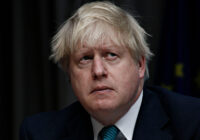In this edition of The Interview, Fair Observer talks to Malcolm Sawyer, professor emeritus of economics at Leeds University.
In June 2016, a majority of Britons decided in a referendum that the United Kingdom should leave the European Union in what has become known as Brexit. The UK is the first EU member to have triggered Article 50 of the Lisbon Treaty, which initiates a procedure for the withdrawal from the union. The country is scheduled to leave on March 29.
Brexit has been an area of debate for the past three years. The biggest impact has perhaps been the polarization of British society and the decline of tolerance in a country where immigrants constitute the backbone of the national economy.
Although leaving the European Union will render the UK more independent in establishing trade agreements with other countries, many of the 51.9% of Brits who voted Leave now believe their choice would be different if a second referendum were held today. A recent survey by YouGov found that 46% of British people would vote to remain, 39% would vote to leave and the “rest either did not know, would not vote, or refused to respond to the question.”
The EU has agreed with the British government a 585-page withdrawal deal, highlighting the terms of the UK’s departure from the union. It includes how much the UK owes to the EU, details of a transition period and citizens’ rights. But the UK House of Commons rejected the Brexit deal in January by a vote of 432 to 202 — the biggest defeat in British history for a sitting government.
As things stand, the UK will crash out of the European Union at the end of March. This has come to be known as a “no-deal Brexit.” If this happens, the UK would immediately leave the union overnight, cutting its ties with the world’s biggest trading bloc. This would mean a number of things such as border checks on goods being reinstated, transport and trade being affected and “economic shock” ensuing, according to Bank of England Governor Mark Carney.
In this edition of The Interview, Fair Observer talks to Malcolm Sawyer, professor emeritus of economics at Leeds University’s Business School, about Brexit and its implications for the UK.
The transcript has been edited for clarity.
Kourosh Ziabari: What would you say if you were asked to weigh the pros and cons of Britain’s withdrawal from the European Union against each other? In what ways will leaving the EU affect the United Kingdom, and where is the impact mostly negative?
Malcolm Sawyer: The European Union has promoted the economic and social integration between European nations. The central importance of its “four freedoms” — free movement of labor, capital and goods and services — illustrate that. These have been important developments, which have been generally beneficial, though the economic gains from the free movements of goods and services tend, in my view, to be overstated. The benefits of the free movement of labor could be enhanced through developments in employment and industrial relations law and moves to develop EU-wide unemployment insurance.
Many of the cons of withdrawal stem from the reversals of economic and social integration. The UK has been a member of the European Union for over 45 years, where there have been a considerable amount of integration between the peoples of member countries. Over those 45 years, many decisions have been made and actions taken on the basis of the UK’s continuing membership of the EU — ranging from the formulation of the Good Friday Agreement on the peace process in Ireland through decisions on residence in other countries within the EU and location of production and trade arrangements.
For many of us, there will be what amount to minor irritants — a visa may be required for a stay over three months in an EU country, the European Health Insurance card providing a degree of health cover in EU countries no longer operates, etc. For others, the effects will be much more substantial, with EU citizens living in the UK with considerable insecurity on their position and on UK citizens living in the EU; for example, through loss of social benefits.
Many advocates of Brexit would view the reversal of integration as a benefit, particularly where that integration has involved the free movement of labor — not a view I would share. There are, however, a range of economic and social policies that are effectively determined at the EU level and where UK withdrawal could lead to significant changes in policies. These include agricultural, regulatory, industrial and labor market policies as well as state aid. These aspects can be a pro or con. Policy decisions are shifted to the national level, but with the loss of gains from cooperation, the policies adopted at the UK level may — depending on one’s political perspectives — be better or worse than the current policies.
The economic effects of departure would depend on the closeness of the trade relationships between UK and the EU post-Brexit, how well the adjustments to a new trade regime are handled, and the economic policies subsequently pursued by the UK government. At present, there is continuing ambiguity over the trade relationship between the UK and the EU, but it is likely to be toward the more distant and more disruptive end of the scale with, at most, an eventual free trade agreement.
My view has long been that a close customs union and regulatory alignment relationship with policies to ease the transition through regional and industrial policies — for example, the shifts in the composition of trade — could mean small negative effects on the UK economy. A major difficulty has been that many Leave voters, particularly on the right of the Conservative Party, have interpreted the Leave vote as being minimal links with the EU in the name of “taking back control” and to avoid anything that could be labeled “Brino” — Brexit in name only.
The UK has been a net contributor to the EU budget, and claims by the Leave side on its scale during the referendum campaign were clearly overblown. There are likely to be substantial payments made by the UK as part of the withdrawal process, amounting to as much as €39 billion [$44.2 billion]. But, at some stage, the UK government could divert the net contributions toward domestic spending. Indeed, I would go further and advocate fiscal reflation, through borrowing, in the event of a downturn following Brexit. Brexit would enable a recasting of agricultural policies and of boosting funds for regional and industrial development.
Ziabari: The Brexit referendum resulted in a majority of 51.9% of voters being in favor of leaving the European Union. It wasn’t a landslide victory for the Leave campaign and many critics have claimed that had people been provided with more information about the consequences of leaving the EU, the outcome would have been different. What’s your view on that? Would a second referendum produce different results?
Sawyer: The referendum was relatively unusual in that the government and most political parties supported the status quo (remain in the EU) and the proponents of the change option (leave the EU) did not have to set out what the leave option would involve, particularly in terms of the future relationship between the UK and the EU. There was an inevitable lack of information on what the future relationship would be, which enabled the campaigners for Leave to make different claims. For example, some claimed that the UK would remain in a customs union, some advocated for free trade relationships and others the abolition of all tariffs on trade.
There were many aspects of the UK leaving the EU that were largely ignored in the debates over Brexit — the most notable being the implications for the border between Northern Ireland and the Irish Republic and for the Good Friday Agreement. This has become a crucial issue in the formulation of the withdrawal agreement. Another concerned the implications for EU citizens resident in the UK and British citizens living in other EU countries. In many ways, it was not so much a lack of information — though implications for, say, UK citizens living in other EU countries would have to be a matter for subsequent negotiations — as a lack of any focus on those issues, and for most people a lack of concern on these matters.
Another factor that has to be weighed in balance is the extent of electoral malpractice. The Vote Leave campaign was penalized by the Electoral Commission for overspending and the harvesting of UK voters’ personal data. How far these malpractices influenced the outcome is a major unknown. My guess would be that the targeted messaging by the Leave campaign playing on fears of migration and promoting the slogan of “take back control” was a significant factor in raising voter turnout.
I do not expect there to be a referendum in 2019 for a number of reasons. One is the logistics: The UK is scheduled to leave EU on March 29 when the two-year period of negotiations under Article 50 of the Treaty of Lisbon expires, and a referendum with time for the necessary legislation, preparation and campaign would take around six months. Another is the clear absence in Parliament of a majority in favor of a referendum. In the event of a deal having been agreed by Parliament, how likely is it that the government and MPs would back a referendum? And there would have to be agreement on what is on the ballot paper — if it is a leave/remain vote, leave on what terms? If, as some have suggested, a number of leave options as well as remain, then how many options? And should the remain also be split as remain on present terms and remain with intention of pushing for reforms?
The opinion polls do not indicate much of a shift in view — Remain tends to be a little ahead of Leave, as the Remain vote was prior to the referendum in 2016. There is evidence that there has been movement when it comes to those who would be eligible to vote in 2019 but who were too young in 2016, as well as some people who lean toward Remain with the intention to vote but who did not in 2016.
The outcome of a new referendum could well depend on what is on the ballot paper. In the initial referendum, as indicated, the Leave option was not well specified in terms of post-exit trade and other relationships between EU and the UK. There are a various trade relationships that could potentially be on the ballot paper — including trade between the UK and EU without specific trade agreements, construction of a free trade arrangement, and a type of customs union relationship without or with the UK’s membership of the EU single market.
In the unlikely event of a referendum, the result may well depend on the level of voter turnout. The initial referendum was characterized by relatively high turnout, especially in areas where general election turnout had been relatively low and from those enthused by the prospect of leaving the EU. It is difficult to say whether that enthusiasm would carry over. Though evidence suggests that people have stronger attachments to Remain or Leave, as the case may be, than they do to their preferred political party.
Ziabari: Do you think 16- and 17-year-olds, expats living abroad and EU citizens working in the UK should have been given a vote in the referendum? Would this have significantly influenced the outcome?
Sawyer: I would argue for the voting age to be lowered to 16 more generally. Expats who had been living abroad were allowed to vote in referendum, except those living abroad for more than 15 years. There would have been a strong case for allowing EU citizens in the UK a vote in the referendum on the same basis as they have voted in a range of UK local and devolved authority elections, though not the general election. The majority for Leave was around 1.3 million. Given the number of 16- to 17-year-olds and EU citizens resident in the UK — around 4.5 million in total — it is clearly possible that the result would have been for Remain, assuming a strong Remain vote amongst those two groups.
Ziabari: Do you think the Brexit vote and the actual withdrawal of the UK from the EU will polarize British society and lead to greater social and racial gaps? Will Brexit make Britain an intolerant society?
Sawyer: Britain has long been a polarized society, and it has become increasingly so on measures such as income inequality. Brexit and recent voting patterns have highlighted a rift — not dissimilar to the US — between the socially liberal, the relatively young, the socially conservative and relatively old. There is a strong relationship between the position on the conservative/liberal dimension and their likelihood to vote Leave/Remain.
The referendum campaign and the ongoing debates on the withdrawal arrangements have exposed the divisions within the UK and the degrees of intolerance and hostility toward foreigners and foreign governments and institutions that were already there. On social media and in the mainstream media, anti-foreigner, anti-immigrant and racist comments are frequently expressed.
There has also been a growing intolerance between Leavers and Remainers. There are considerable possibilities of civil unrest. An exit on March 29 under a no-deal situation with the disruptions to, for example, imports of medicines and food would likely be involved. Any moves toward Remain, even in the form of a referendum, would likely spark mass demonstrations.
Ziabari: How will Brexit affect Britain’s economy? Will the economy suffer a setback, with Britain losing its standing as one of the world’s largest economic powers?
Sawyer: The UK’s exit from the EU will inevitably have some disruptive effects on the UK economy, as any significant changes in trading arrangements would do. Some areas of activity will be harmed, notably those that benefit from the customs union and single market arrangements of the EU, as tariffs and customs checks would make exporting to the EU less attractive. Companies involved in supply chains crossing national borders, particularly those using just-in-time production techniques would find some disruption. Other areas of activity may well benefit — those sectors that produce goods that face competition from imports from the EU, which would become more expensive.
The extent of the disruption will depend on the future trading relationship between the EU and the UK. At one end of the spectrum, a customs union and regulatory alignment may have limited effects on trade and economic activity, whereas on the other end of the spectrum — no trade deal — the effects may be more substantial.
 The macroeconomic forecasts on output, growth and employment over a 15-year period not surprisingly found the effects would depend on the nature of post-Brexit trade relations. The general consensus has been for lower output than would have been the case and much lower trade volumes. The scale, however, does not mean that the UK would not be one of the largest economic powers.
The macroeconomic forecasts on output, growth and employment over a 15-year period not surprisingly found the effects would depend on the nature of post-Brexit trade relations. The general consensus has been for lower output than would have been the case and much lower trade volumes. The scale, however, does not mean that the UK would not be one of the largest economic powers.
Ziabari: How will Britain’s absence from the EU empower Germany? There will be no UK contribution to the EU budget, as well as no UK conflict on issues such as larger trade deals with developing countries and the further enlargement of the EU. Are we going to see a more influential and powerful Germany, along with a Britain that is less interventionist in European politics and global affairs?
Sawyer: The UK has been a net contributor to the EU budget —minus payments to the UK in respect of the Common Agricultural Policy [CAP] and regional and structural fund — of less than €10 billion, in comparison with a total EU annual budget of around €150 billion. So, there will likely be some scaling back of EU activities, since the bulk of expenditures are on CAP and regional structural funds in those areas.
Leaving the EU does mean that the UK loses out in terms of the trade arrangements negotiated by the EU with third countries — the EU-Japan and EU-Canada free trade agreements being the two recent examples. A significant issue for the UK is the need to replace such arrangements with UK-Japan, UK-Canada ones. Many advocates of Brexit have made overblown claims on possibilities of trade deals between the UK and other non-EU countries, but it would seem more likely that the UK will lose out from non-participation via the EU in trade arrangements with other countries.
Germany’s position within the European Union is already a strong one, and it is only slightly strengthened by a UK exit. A more powerful Germany in the world is, in my view, unaffected by Brexit.
Ziabari: How do you think the withdrawal of Britain from the EU will impact immigration to the United Kingdom?
Sawyer: Much of the impetus behind the Leave vote appears to have been a drive to control and reduce immigration — control meaning the end of free movement of labor within the EU. This has gone alongside policies promoted by Prime Minister Theresa May when she was home secretary to create a “hostile environment” for immigration into the UK. The alternative policies on immigration that are being taken through Parliament at present would mean that those from EU countries would be subject to the same rulings as non-EU citizens, and the likely outcome would be a significant reduction in the number of migrants.
There will be major changes in respect of immigration as the free movement of labor within the EU is replaced by new immigration rules. Proposals for new immigration laws are currently under discussion, but may well aim to restrict those earning under £30,000 ($38,700). This would be proposed to sharply reduce immigration and to do so in ways that are particularly harmful. Many sectors such as the caring professions are particularly reliant on immigrant labor. I would expect that the volume of immigration will fall substantially, particularly if the Conservative government continues in power with the apparent hostility toward immigrants, and the ways in which the UK has become a much less welcoming place, which will also include effects on British higher education being able to attract students.
Ziabari: According to an Institute of Directors survey, 29% of UK businesses and enterprises are considering moving abroad because of Brexit. This is mostly blamed on the uncertain climate as a result of the government’s inability to agree a Brexit deal with the European Union that is passed in the UK Parliament. What does this mean to you?
Sawyer: It has long been thought that an atmosphere of uncertainty will lead to decisions being delayed until the situation becomes clearer, and to avoid making long-term commitments. Investment in productive capacity is an area where uncertainty leads to delays in decision and avoidance of long-term investments. The uncertainty generated at present, so far as firms are concerned, covers variables such as what tariffs would be charged on exports to the EU, what effects there will be on customs arrangements and so on.
It could be expected that uncertainty delays investment and other long-term decisions until there is some clarification. The companies that would seriously consider relocating their production would be those whose exports to the EU would be particularly affected by tariffs and customs checks, though some of the additional costs may be offset by depreciation of the British pound. Companies that are involved in extensive supply chains, especially those operating on a just-in-time basis, will have incentives to relocate their production. The strength of these incentives will rather depend on the trade relationships put in place and the efficiency of the customs arrangements.
I would interpret responses such as reported here as being more along the lines that trade between the UK and the EU will not be any easier or less costly after Brexit than it is now. So, for many firms, consideration has to be given to relocation of production in order to avoid tariffs and other impediments to selling in the EU. Added to that, there continues to be confusion over what the scale of tariffs and customs checks that will operate for trade between the UK and the EU. Even if the UK is able to agree a withdrawal agreement with the EU, there would be at least a 21-month transition period, during which there would be negotiations on the specific trade relationships.
The views expressed in this article are the author’s own and do not necessarily reflect Fair Observer’s editorial policy.
Support Fair Observer
We rely on your support for our independence, diversity and quality.
For more than 10 years, Fair Observer has been free, fair and independent. No billionaire owns us, no advertisers control us. We are a reader-supported nonprofit. Unlike many other publications, we keep our content free for readers regardless of where they live or whether they can afford to pay. We have no paywalls and no ads.
In the post-truth era of fake news, echo chambers and filter bubbles, we publish a plurality of perspectives from around the world. Anyone can publish with us, but everyone goes through a rigorous editorial process. So, you get fact-checked, well-reasoned content instead of noise.
We publish 2,500+ voices from 90+ countries. We also conduct education and training programs
on subjects ranging from digital media and journalism to writing and critical thinking. This
doesn’t come cheap. Servers, editors, trainers and web developers cost
money.
Please consider supporting us on a regular basis as a recurring donor or a
sustaining member.
Will you support FO’s journalism?
We rely on your support for our independence, diversity and quality.






